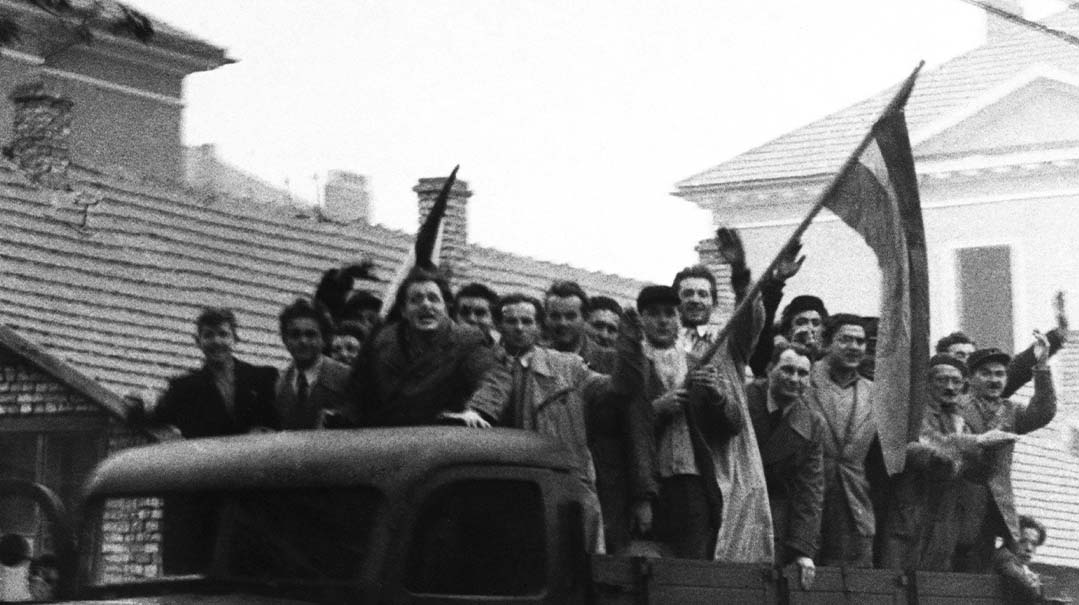Last Chance for Freedom

Sixty years ago revolution erupted in Hungary. As the country convulsed with calls for freedom, the borders were left unguarded, allowing thousands to flee. Among those were 20,000 Jews, with prayers for a better future on their lips they fled into the dark night. Where are they now?

Photos: AP
This October 23 marks the 60th anniversary of the Hungarian Revolution, a date that’s now a national holiday in Hungary. For Hungarians, it marks a brave but failed effort to rescue their country from the vise of Communism. For Jews, it marks something more: the uprising opened a brief window for 20,000 Jews to flee the country, as borders were left unguarded in the confusion.
The revolution was the result of the geopolitical arrangement after World War Two. In 1945, Hungary became a satellite of the Soviet Union, led by Matyas Rakosi (a Jewish Communist). Under his reign of terror, thousands were arrested, tortured, imprisoned, tried, deported, or executed by the secret police. The general misery was compounded by the Communist economic system, which resulted in hyperinflation, food shortages, and a dearth of housing and jobs.
The US had intimated that it would provide aid if the Hungarians sought to break away. In October 1956, students and supporters in Budapest rose up and declared demands for change. Some 20,000 people marched through the city to the Parliament building, toppling a statue of Stalin along the way. When a group of students entered a radio building, hoping to broadcast their demands, they were detained inside. This set off demonstrations outside, and police began firing on the crowd. Riots and violence followed.
The insurgents almost succeeded; by the end of October, they’d declared a new government, led by reformist former prime minister Imre Nagy. Hungary withdrew from the Warsaw Pact binding it to the USSR, and disbanded the secret police.
But the leaders of the Soviet Union weren’t willing to lose an important satellite, and sent tanks and troops to invade on November 4. Some 2,500 Hungarians and 700 Russians were killed in the ensuing skirmishes, which went on until the 10th; the promised American help never arrived. Arrests continued through January, and Nagy was executed.
The Iron Curtain would slam shut on Hungary until 1989, when the Third Hungarian Republic was declared. But during the chaos of the Revolution, approximately 200,000 Hungarians crossed into neighboring countries. For frum Jews, it wasn’t just a question of a better life. It was a matter of spiritual life or death.
Miriam Strasser
Mrs. Strasser, a Teaneck mother of five and grandmother many times over, left Hungary with her parents when she was ten years old. We met her in her parents’ apartment, where her diminutive mother served coffee on flowered china, and Miriam spoke about her family’s harrowing attempts to flee.
My father survived the war in a work camp — “1,860 days,” he’ll tell you — and lost all but two brothers of a family of eight siblings. My mother, whose grandfather was a dayan in Eger, was deported to Auschwitz, where she and three siblings survived from a family of eight.
They married in 1949 and settled in a town about two and a half hours outside of Budapest called Pecs, which had numbered 80 Jewish families before the war and now counted only ten. My father would travel to other towns to buy fish for Shabbos, and my mother saved up to buy a leichter. Making Pesach was a huge undertaking, and since we had no refrigeration, everything was made fresh.
In the early years after the war, it was still possible to leave Hungary legally. But my mother had severe chronic pain in her right hand, the consequence of a blow from a Nazi, and needed an operation in Budapest. They missed the window of opportunity to leave.
The Communists began seizing private businesses and issuing coupons for flour, sugar, and eggs. My parents had a chicken coop in the yard, so we had a little meat for Shabbos. My father would take eggs to Budapest to sell, and revived a former family business of selling medicinal roots and herbal teas.
What stands out in my mind was the constant fear of those years. Schoolchildren were encouraged to tattle on their parents, and non-Jews loved to denounce Jews. Everyone was terrified of the secret police, the AVH. Someone once tried to frame my parents by leaving an illegal gun in the attic, but my parents took it straight to the authorities.
Oops! We could not locate your form.






